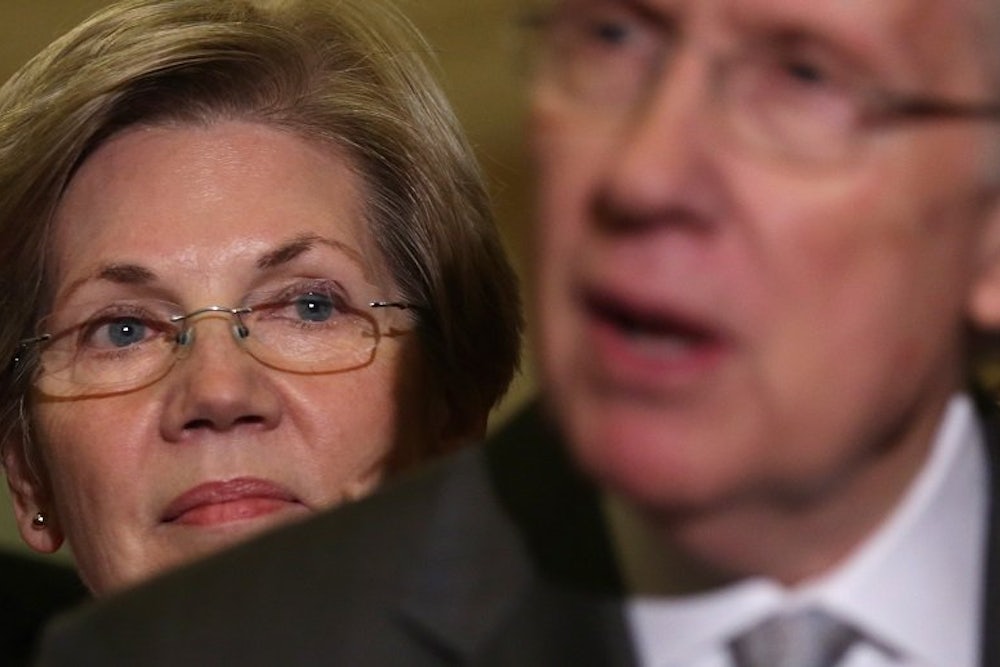Senate Minority Leader Harry Reid’s announcement Friday that he will not seek reelection has led to wild speculation about who will replace the long-time Democratic leader. The smart money, right now, is on New York Senator Chuck Schumer, especially because Reid endorsed him already. But liberal groups are quickly marshalling their support for Senator Elizabeth Warren.
“If Elizabeth Warren doesn’t run for president, she should definitely run for leader of the Senate,” a spokesman for Democracy for America told the Washington Post’s Greg Sargent. “The election for Senate leader is not going to be a slam dunk for any early front-runner, especially someone like Senator Schumer. He’s closer to Wall Street while the Wall Street wing of the party is dying and the Elizabeth Warren wing is rising. It only makes sense that the next leader of the U.S. Senate is either from that wing or deeply understands how to work with that wing.”
This is a terrible idea, one that would not just kneecap Warren’s greatest skills as a legislator, but would also hurt the Democratic Party and thus set back progressive causes.
Congressional leaders need a few key abilities to be successful. For one, they have to be able to raise a lot of money. Fundraising is a key part of the job, and Warren is undoubtedly a fundraising behemoth. She’s a superstar on the left and can bring out big crowds—and donors—wherever she goes.
But that’s only one part of the job. “The Senate leader has to have a firm mastery of the rules, a strong strategic sense, and the ability to build and maintain confidence across a very disparate group of colleagues, all of whom have outsized egos,” Norman Ornstein, a resident scholar at the American Enterprise Institute and a long-time Congress watcher, wrote in an email. “A good leader needs to know when to hold 'em and when to fold 'em.” There, Warren comes up short.
Most importantly, she’s only been in the Senate for two years (it will be four years by the time Reid actually retires). That’s not very long. There’s a reason that freshman legislators handle the gavel—they need to learn the rules of the Senate. Warren could certainly study to become an expert on parliamentary procedure, and can amass a capable staff with significant institutional knowledge to help her as well. But it's very difficult to replace the years of experience that most congressional leaders accrue on their way to a leadership position. As the Democratic leader, Warren would face situations where she has to think quickly on her feet and employ different parliamentary tricks. Her inexperience makes that a risky proposition for Democrats.
For an example of this, Democrats have to look no further than Republican Senator Ted Cruz, who occupies a similar space in the conservative political world than Warren does on the left (both sides would surely bristle at that comparison). In December, Cruz tried to use the parliamentary rules to block President Barack Obama’s executive action on immigration. The gambit blew up in his face, as it allowed Democrats to pass a number of nominees that would not have passed in the 113th Congress otherwise. Cruz had to apologize to his Republican colleagues.
Warren also does not have—or want to have—the necessary coalition-building skills to be Senate majority leader. The Democratic leader needs to keep the party united and fashion compromises between moderate, red state senators and more liberal, blue state ones. Over the past few years, we’ve seen what can happen when a congressional leader, House Speaker John Boehner, can’t keep his conference united. The Democratic Party is far less ideologically divided than the GOP, so the party leadership faces less of a challenge keeping unity. But that challenge is there nonetheless.
Warren is best at exploiting that need for unity, using it to gain more prominence within the party and in the media. She can rail against “too big to fail” banks on the Senate floor without fear about how Wall Street Democrats will react. After all, she doesn’t need to unite them behind a piece of legislation. But as the Democratic leader, that job would suddenly fall to her, and it would make it far more risky for her to give those floor speeches.
“Some senators can be extraordinarily effective on the issues, setting agendas, and moving the needle without having those qualities that make effective party leaders,” Ornstein said. “That describes Elizabeth Warren.”
Undoubtedly, progressive groups that are promoting Warren are doing so to move the entire process to the left. They want to pressure Schumer, who many liberals believe is too close to Wall Street, into adopting more progressive policies and, assuming he wins, moving the Democratic Party to the left. That might work, although with Reid’s endorsement of Schumer, it seems the replacement-picking process is already over.
Progressives should recognize that Warren is exactly where she needs to be to have the greatest impact in the Senate. Giving her more power would, in fact, make her less powerful.
